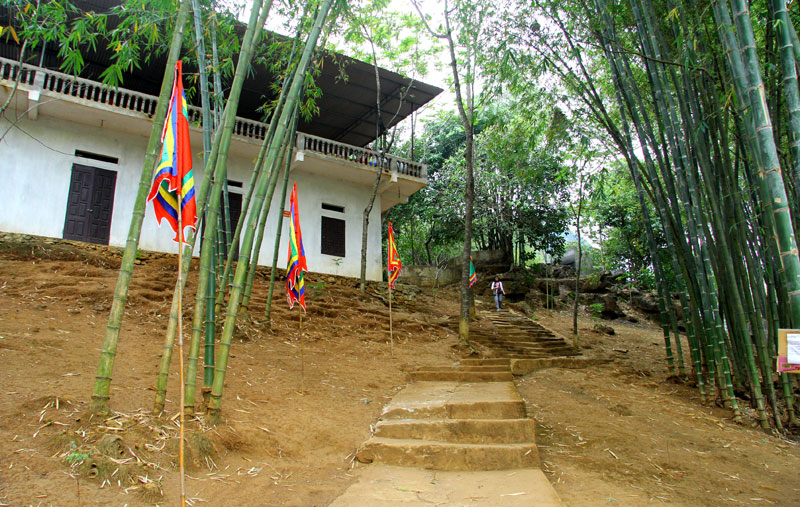
(HBO) – The Temple of Mieng Cave is a famous attraction of spiritual tourism in the area around Hoa Binh Lake. It is located in Quang Minh commune of Van Ho district, Son La province. Tourists can reach the temple by both waterway and road. Those who come to the temple by boat can depart from Bich Ha Port or Thung Nai Port which are 70km and 50km away respectively. The temple is a solemn place of worship and believed to be very sacred by local people.

The
Temple of
Mieng Cavein Quang Minh commune of Van Ho district, Son La province
Mieng
Cave is an old karst cave which was previously a stopover of
traders from lowland regions and fishermen. Residents built a temple there in
commemoration of Dinh Thi Van, a heroine from the Muong ethnic minority group,
who encouraged local people to donate food. She, together with other people,
navigated boats along the Da River to carry food to the army of King Le Loi.
After a number of successful food delivery trips, one time, her boat full of
food encountered a storm and sank in a river section near
Mieng
Cave.
Her body was drifted to the area of Thac Bo (Bo Waterfall). To show respect for
and commemorate her merit, local people built a temple dedicated to her at
Mieng
Cave.
It is also called the temple of the Lord of Mieng Cave.
In the early 20th century, the French
colonialists expanded the temple. A temple of the Lord of Bo Waterfall in Vay
Nua commune of Hoa Binh province was also set up to wish for her protection of
trips along the Da River. When the Hoa Binh hydropower plant was constructed,
this temple was flooded and then moved to
Dau
Rong
Mountain.
The Temple of Mieng Cave is believed to be very
sacred. Once coming to the temple, visitors can enjoy the picturesque beauty of
Hoa
Binh
Lakeand tranquil moments while learning more about legends of Dinh Thi Van. Prayers
for peace, wealth and children said at the Temple of Mieng Cave are also
believed to come true. In the past, visitors to the temple were mainly people
residing along the Da River in Hoa Binh and Son La provinces. At present, the
temple is a must-visit destination for all who tour the Da River.
The area of
Mieng
Cavealso has a flea market opened on the 1st, 2nd, 11th, 12th, 21st and 22nd of
every month. A number of ethnic people from communes bordering
Hoa
Binh
Lake come to the market
on these days. The market features all types of products, from vegetables, fish
to essential goods serving the daily life and production activities, creating
worth-to-explore identities for visitors to the Temple of Mieng Cave./.
Located just a 20-minute drive from Hoa Binh City, Ora Hill Farmstay & Glamping Hoa Binh is a captivating new destination nestled in Mo hamlet, Bình Thanh commune, Cao Phong district. Combining farming with leisure, this tranquil retreat is perfect for those seeking balance, joy, and an immersive experience in the expansive beauty of nature.
Muong Bi - Tan Lac is renowned as one of the four famous Muong regions in Hoa Binh province. Blessed by nature with a favourable climate and stunning landscapes, Tan Lac holds great advantages for tourism development. The local tourism industry has made remarkable strides in recent times thanks to the attention and support from the local authorities and sectors.
With its strategic location, well-developed transport network, and diverse soil and climatic conditions, Hoa Binh is emerging as a must-visit destination in Vietnam's northwestern tourism corridor. The province boasts numerous attractions, including the Kim Boi hot springs (Kim Boi district), the Dau Rong cave complex (Cao Phong), the Mai Chau valley (Mai Chau), and the iconic Hoa Binh hydropower plant.
The northern mountainous province of Hoa Binh has been listed among the 71 most beautiful places to visit worldwide by the prestigious US travel magazine Condé Nast Traveller.
Hoa Binh province’s rich natural and cultural resources position it as a prime location for developing community-based tourism (CBT). In recent years, support from central and provincial policies, as well as assistance from non-governmental organisations, have encouraged local ethnic minority and mountainous communities to actively engage in the sector.



